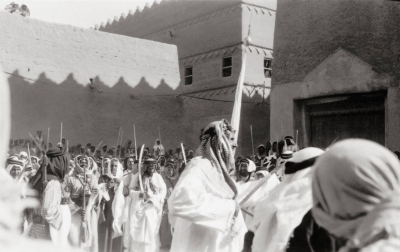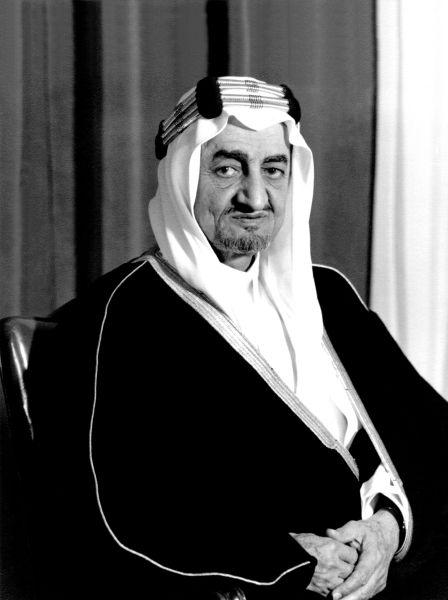
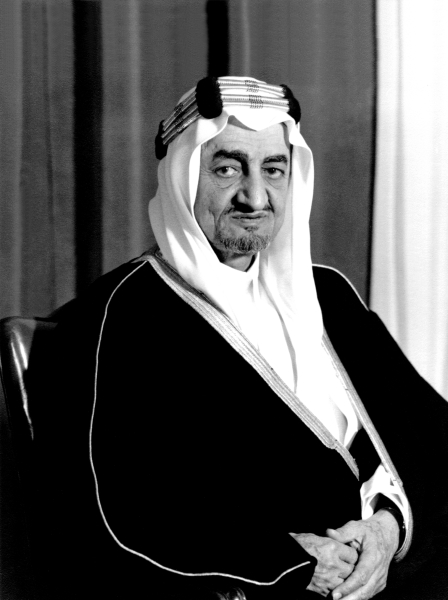
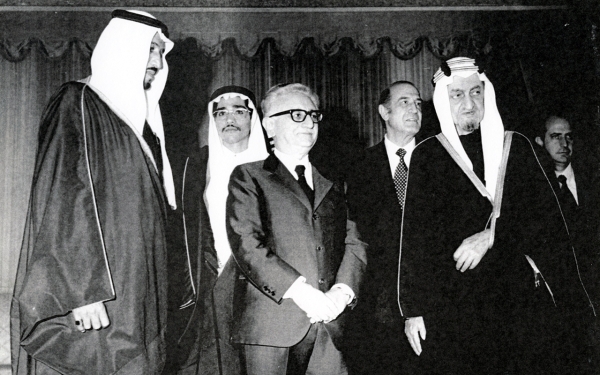
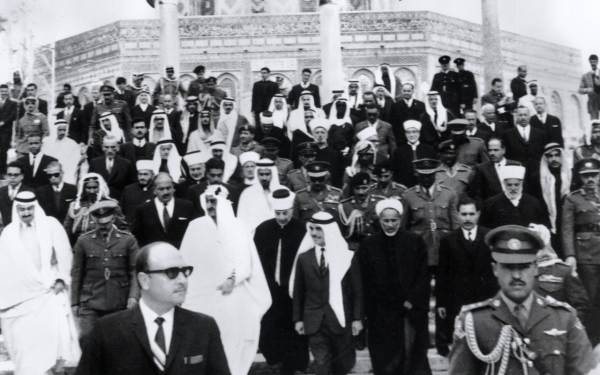
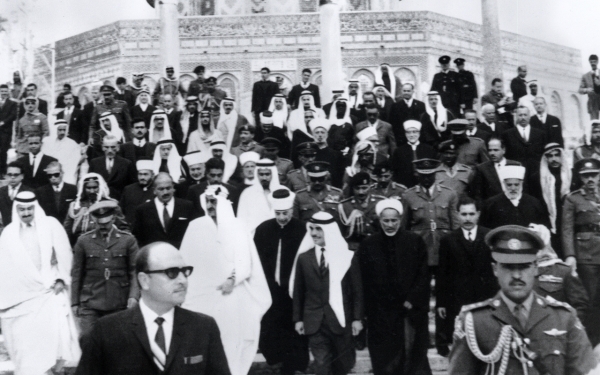
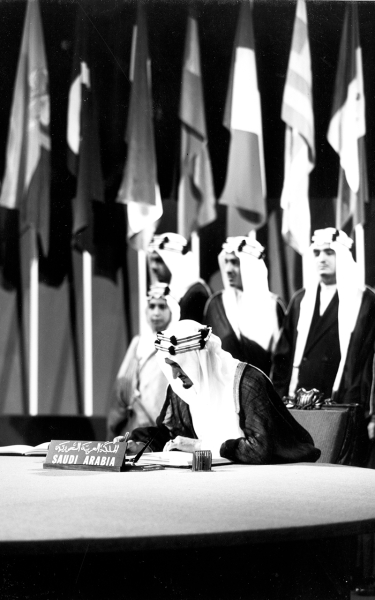
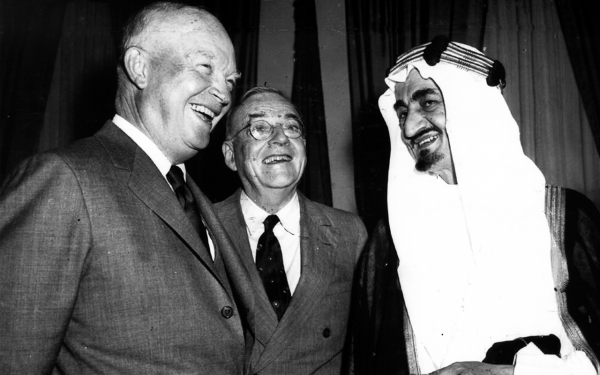
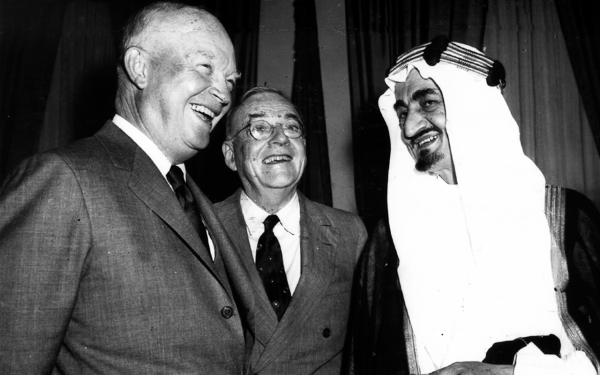
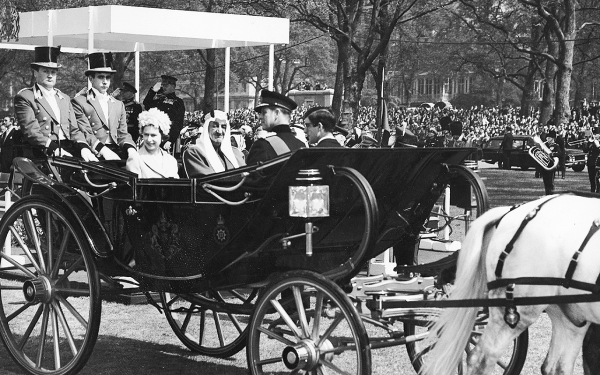
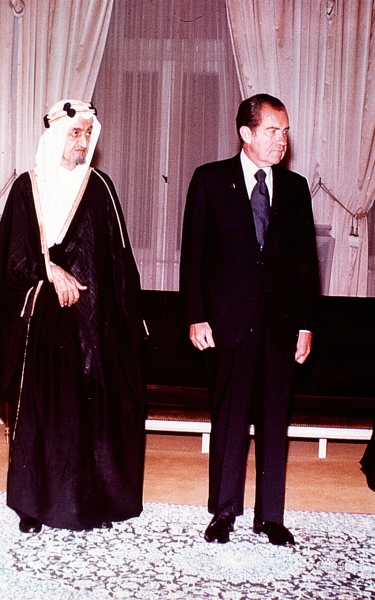
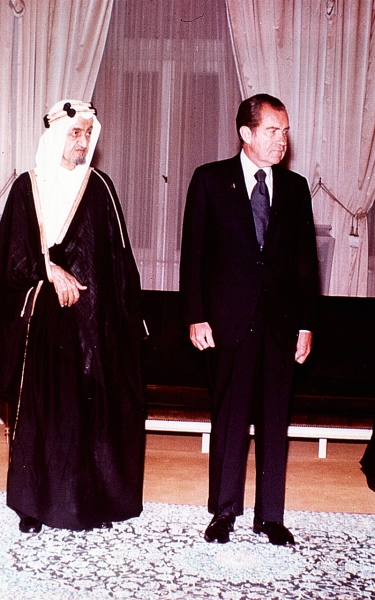
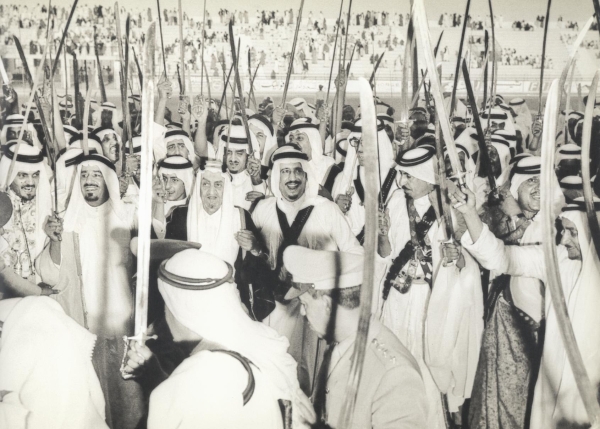
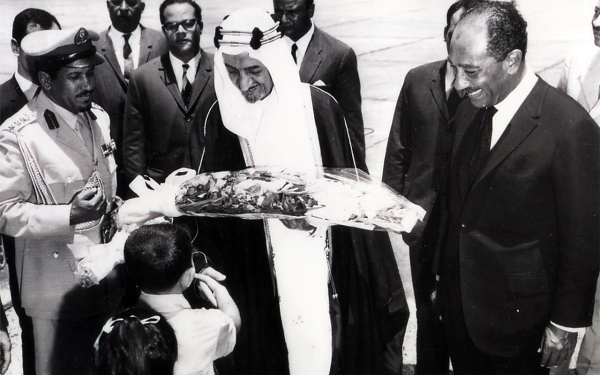
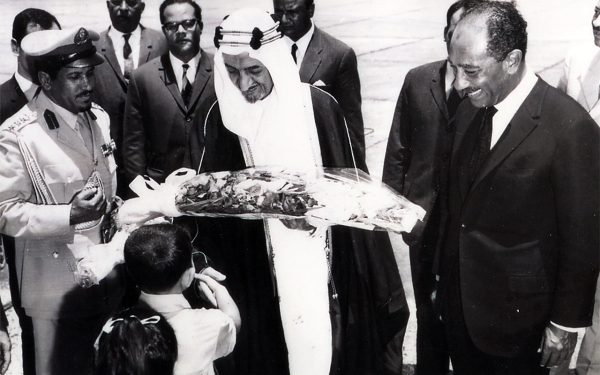
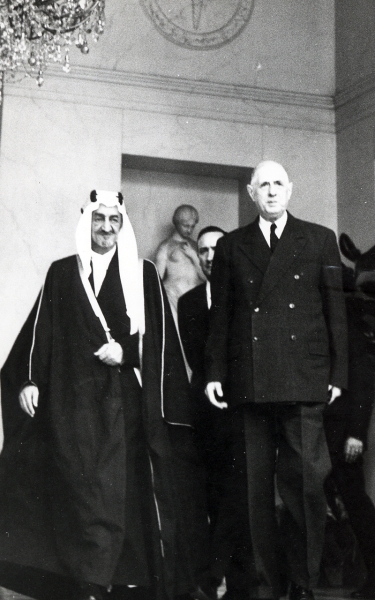
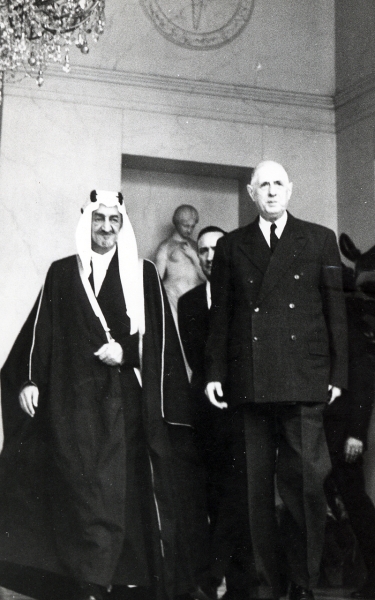
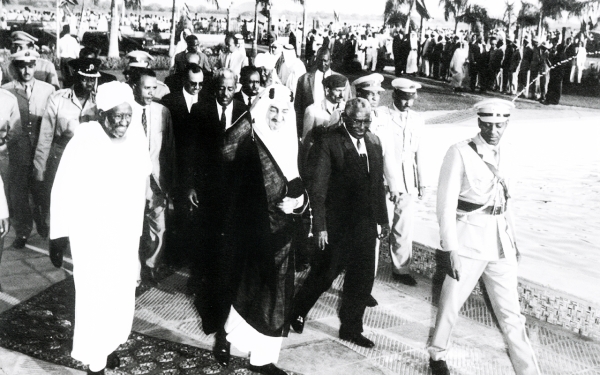
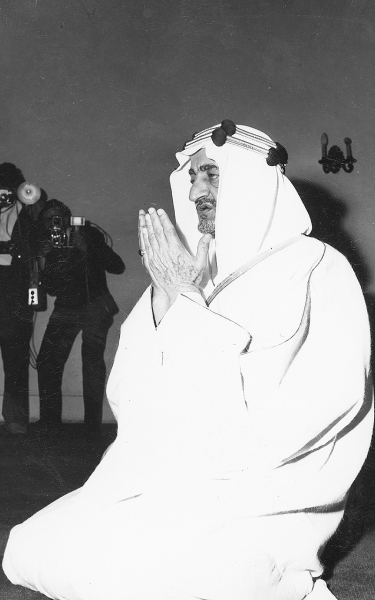
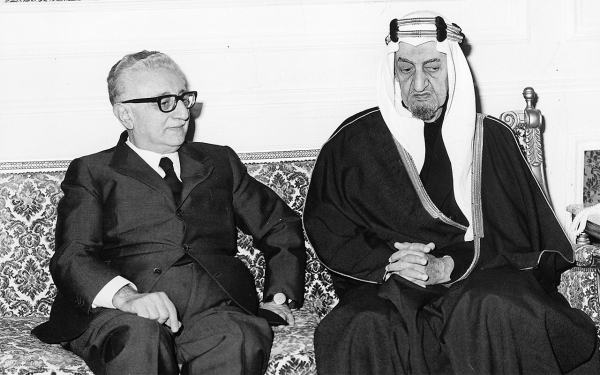
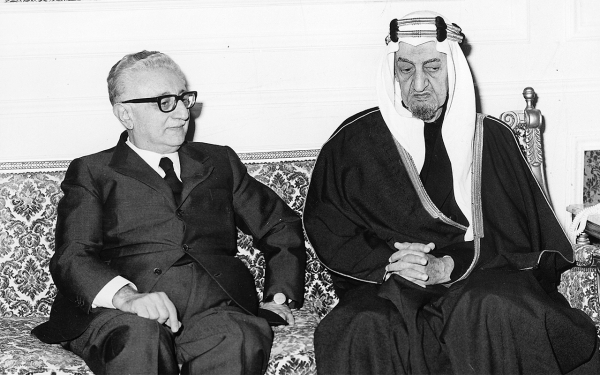
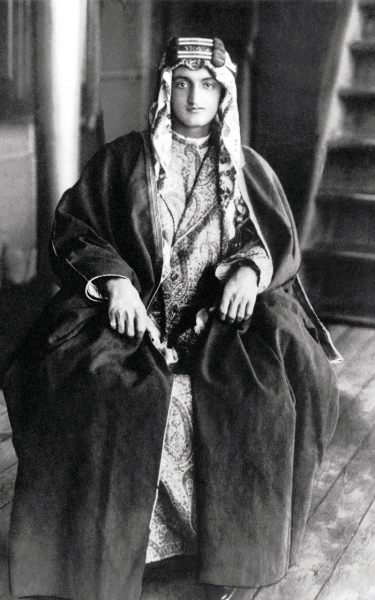
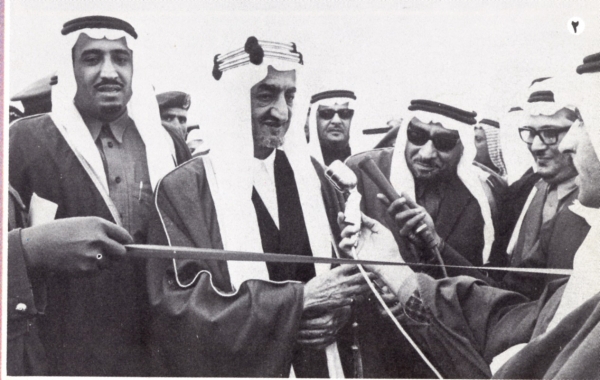
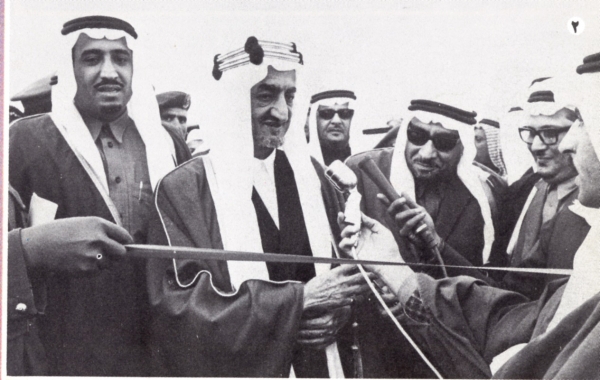
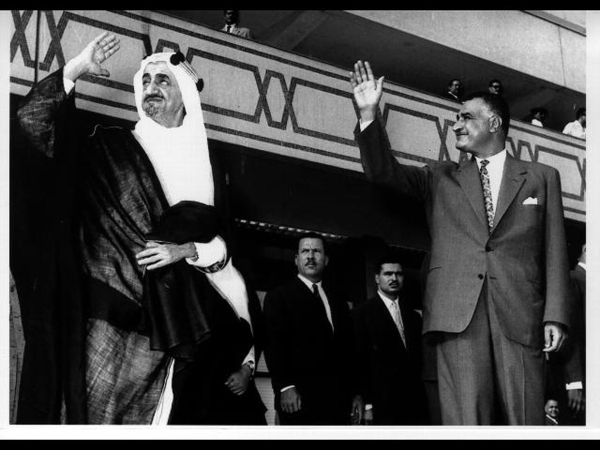
King Faisal Bin Abdulaziz Al Saud (1906-1975) was the third king of the Kingdom of Saudi Arabia and the third son of King Abdulaziz. He ascended to the throne in 1964, succeeding his brother, King Saud Bin Abdulaziz. He remained king for eleven years before his assassination in 1975. King Faisal was known for his positions in defense of Arab causes, the unity of the Arab world, and advocating for Islamic solidarity. He was followed in rule by King Khalid Bin Abdulaziz.
King Faisal Bin Abdulaziz
He is Faisal Bin Abdulaziz Bin Abdulrahman Bin Faisal Bin Turki Bin Abdullah Bin Mohammed Bin Saud Bin Mohammed Bin Muqrin Bin Markhan Bin Ibrahim Bin Musa Bin Rabi'ah Bin Mani' al-Muraydi from Banu Hanifah, from Bakr Bin Wail, from Rabi'ah Bin Nizar, from Ma'ad Bin Adnan.
King Faisal was born in Riyadh City in April 1906, during a period when his father achieved victory over his opponent, Ibn Rashid, in the Battle of Rawdat Muhanna. He was named after his grandfather, Imam Faisal Bin Turki, the second Imam of the Second Saudi State. His mother was Tarfa Bint Abdullah Bin Abdullatif Al al-Sheikh. She passed away five months after his birth, and his grandmother from his mother's side, Haya al-Muqbel, raised him in the house of his grandfather, Sheikh Abdullah Bin Abdullatif.
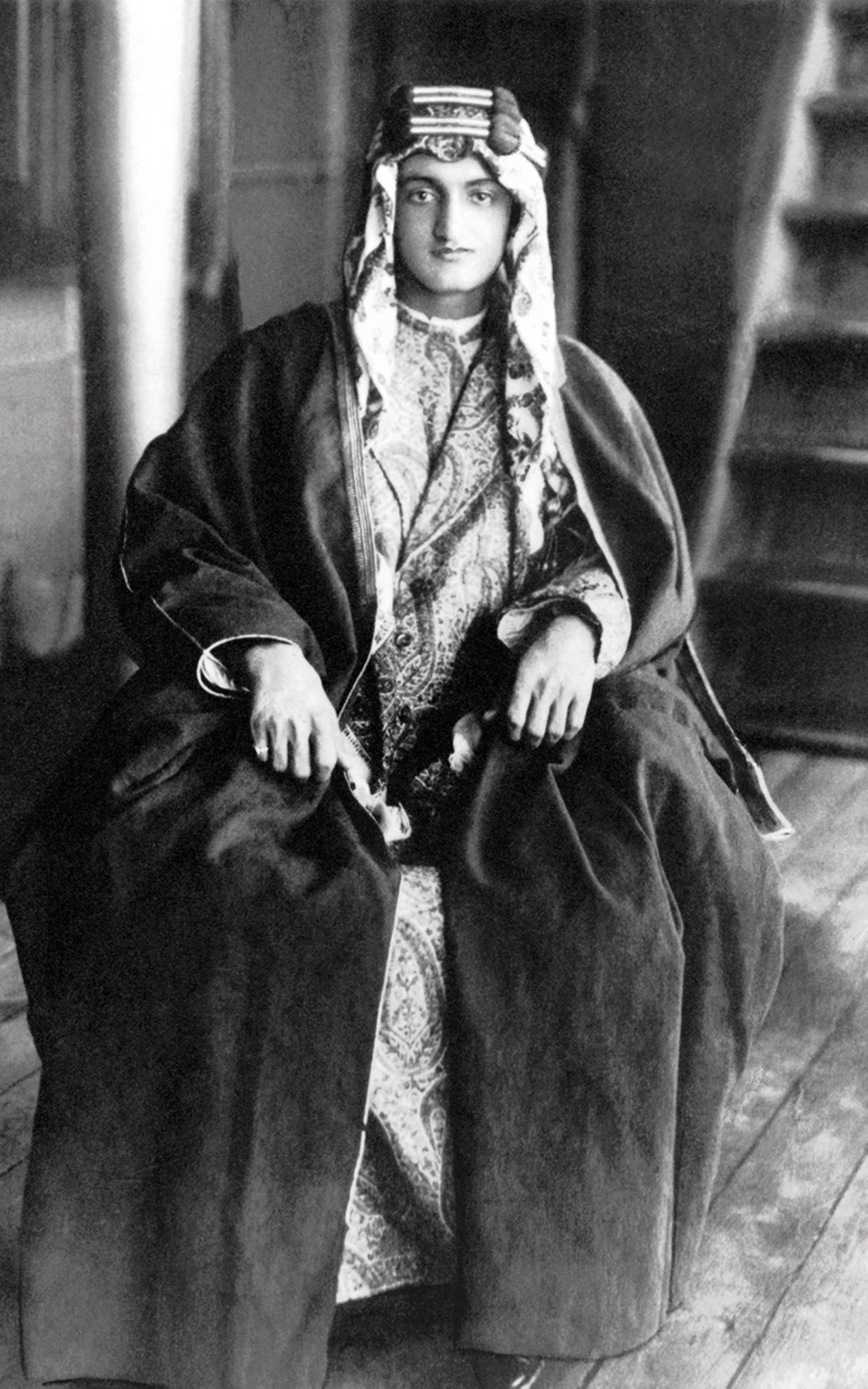
The upbringing and education of King Faisal
King Faisal learned to read the Quran at an early age and completed it by the age of nine. He also learned reading and writing from the traditional kuttab, the traditional education that was prevalent in the Arabian Peninsula during that period. He received religious education from his grandfather from his mother's side, Sheikh Abdullah Bin Abdullatif Al al-Sheikh, and acquired knowledge of equestrianism, shooting, and politics from his father, the founder, along with noble morals. King Faisal was known for his courage, wisdom, and sagacity from his childhood.
He spent his early years in the house of his grandfather from his mother's side, and he continued to reside there until he traveled to Europe for the first time in 1919. Upon his return, he grew up within his father's family, receiving nurturing care from Princess Hussa al-Sudairi, the wife of King Abdulaziz and the mother of his siblings King Fahd and the Custodian of the Two Holy Mosques, King Salman. Upon returning to his father's care, he gained practical experience in the fields of politics and military affairs, learning the art of dealing with men in times of peace and war. He also learned self-discipline, patience, and caution from his father.
Personal traits of King Faisal
The early social upbringing of King Faisal had a significant impact on his eloquence, distinguishing him with fluent Arabic language skills. He had the ability to articulate precisely what he intended and to avoid subjects he chose not to address. According to sources, he is described as a reserved, contemplative, and silent personality - someone who listens a lot, speaks sparingly, carefully chooses his words, tends to be concise, and often inquires about the smallest details on any topic presented to him. King Faisal distinguished himself as the family member responsible for dealing with foreigners in Saudi Arabia's diplomatic relations due to his inherent ability to adapt quickly. He demonstrated a swift adaptability irrespective of the general environment. It was his habit not to show his emotions openly in public, making it difficult to discern his inner thoughts and feelings.
One of his characteristics was humility; he refused to let anyone, including his own children, kiss his hand. This act extended to everyone, regardless of their relationship or status. He was also known for his simplicity, loyalty, generosity, dignity, self-esteem, tolerance, honesty, organization, and care for the feelings of others. He was characterized by qualities, such as patience, foresight, and farsightedness. He had extensive knowledge of ways of dealing with various personalities. According to those close to him, he did not rush to make decisions and avoided extravagance. He was committed to fairness and balance even with those he disagreed with.
The role of King Faisal Bin Abdulaziz in the unification of Saudi Arabia
Military participation
King Faisal engaged in military and political work from a young age, spanning nearly fifty-eight years throughout the history that began with his first involvement. This unfolded over three eras: the reign of his father, King Abdulaziz, the reign of his brother, King Saud, and then his own reign, he gained experience in various matters. From his early years during his father's reign, he began his military involvement by accompanying his father to the Battle of Yatib, southeast of Hail City, in 1918, when he was just twelve years old. Subsequently, he joined his brother, Prince Saud, in the Battle of Shaiba in Hail in 1920.
In 1922, he led a military campaign to Aseer to confront Al Aied troops, marking the first time he commanded a leadership brigade. He succeeded in the campaign, entered Abha, the administrative headquarters of Aseer Province, and incorporated it into Saudi rule before returning to Riyadh. In 1925, he participated alongside his father's forces in the siege of Jeddah City. The siege concluded with the surrender of the city, the departure of Sharif Ali, and the entry of King Abdulaziz into Jeddah in the same year. In 1934, he took command of a sector of the Saudi forces heading from the Hejaz to Yemen. He achieved a military and political victory in this campaign, culminating in the signing of the Taif Treaty in 1934. This treaty resolved all border disputes between Saudi Arabia and Yemen.
Diplomatic participations and work
On the political level, King Faisal led several delegations representing Saudi Arabia on official occasions and visits. His first mission took place when he was thirteen years old. Among the notable participations:
1919: The official visit to Britain on behalf of his father, responding to an invitation from King George V to participate in the celebrations of the victory in World War I. He then visited France in response to a similar invitation, followed by Belgium. The journey lasted about six months, making him the first member of the Al Saud to visit Western Europe. This trip marked the beginning of his extensive involvement in foreign affairs throughout his life.
1924: He issued the first official political statement on behalf of Saudi Arabia from Riyadh titled 'For Truth and History' in response to an article published by Sharif Hussein and his supporters against his father. He followed it up with another statement two months later, becoming the first official spokesperson for Saudi Arabia. In the same year, King Faisal, on behalf of his father, signed the concluding statement of the Riyadh conference, held to consider Sharif Hussein's ongoing act of preventing the people of Najd from performing Hajj for the fifth consecutive year. The statement officially declared war against Sharif Hussein.
1926: He headed a diplomatic delegation to Europe to enhance political relations with those countries, namely Britain, France, and the Netherlands. The journey lasted for about two months. About five months after his return, he represented his father in negotiations with Sir Gilbert Clayton, which concluded with the signing of the Jeddah Treaty wherein Britain acknowledged the full independence of the rule of King Abdulaziz.
1932: King Faisal embarked on his third trip to Europe, marking his first visit as the Saudi Minister of Foreign Affairs. During this journey, he visited Italy, Switzerland, France, Britain, the Netherlands, Germany, Poland, and the Soviet Union. Upon his return, he visited Turkey, Iran, and Iraq, and the trip lasted for three months.
1932: On behalf of his father, he signed the decree declaring the unification of Hejaz and Najd into a single state named the Kingdom of Saudi Arabia.
1933: He chaired the Council of Agents and Shura Council to receive the pledge of allegiance for his brother, King Saud, after a Royal Order was issued for that purpose. He also received the pledge of allegiance for his brother Saud from the general public at the government house in the Hejaz. Later, he traveled to Riyadh, leading a delegation to participate in the ceremony announcing the pledge of allegiance.
1939: He led Saudi Arabia's delegation to the conference of representatives of independent Arab governments held in Cairo regarding the Palestinian issue in preparation for the London Conference. During this event, he met with King Farouk. He then led Saudi Arabia's delegation to the London Conference, the Round Table Conference convened to discuss the issue of Palestine.
1943: While serving as the Minister of Foreign Affairs, King Faisal, signed friendship, good neighborliness, security, and economic agreements with the State of Kuwait. He also represented his father in a visit to the United States in response to an invitation from President Franklin Roosevelt, accompanied by his brother Prince Khalid. This trip marked their first visit to the U.S. Upon their return, they visited Britain in response to an invitation from King George VI, where they met him and Prime Minister "Winston Churchill". Then, he visited Algeria and met with President "Charles de Gaulle", the leader of Free France at the time, at his headquarters in Algeria. This followed an official invitation to visit on behalf of France during World War II. Afterward, he visited Tunisia and then Cairo, where he spent ten days, before returning to Riyadh. This trip lasted for about three months.
1945: He attended the Radhwa meeting between his father and King Farouk, who was visiting Saudi Arabia. In the same year, he chaired Saudi Arabia's delegation at the San Francisco Conference, where he signed the United Nations Charter on behalf of Saudi Arabia, by virtue of which Saudi Arabia joined the international organization. His father then delegated him, along with his brother Prince Mansour, who was the Minister of Defense at the time, to visit Syria and participate in the celebrations marking the first anniversary of the French withdrawal. During this visit, he met with President Shukri al-Quwatli. Afterward, he visited Beirut and met with President Bechara al-Khoury. About five months later, he led the Saudi Arabia's delegation to the Alexandria Conference, invited by the Arab League, to address the issue of Palestine in preparation for the British negotiations on the matter. He then led Saudi Arabia's delegation to the London Conference on Palestine, based on an invitation from the British government.
1946: He visited the United States after attending the first session of the United Nations in London. During his visit, he met President Truman to discuss bilateral relations between the two countries and the Palestinian issue. He also visited Jordan in response to an official invitation from King Abdullah to discuss the Palestinian issue. He led Saudi Arabia's delegation to the United Nations meetings in New York during its second regular session, which focused on the Palestinian issue and the partition plan. He strongly opposed the plan on behalf of the Arab delegations, warning that it would mark the beginning of disturbances in the Middle East. The trip lasted for about four months.
1947: He chaired Saudi Arabia's delegation to the United Nations meetings in New York after the approval of the partition plan. He announced his rejection of the decision and Saudi Arabia's non-compliance with it. Additionally, he led Saudi Arabia's delegation to the Conference of Heads and Representatives of Governments in the Arab League in Cairo to discuss the Arab stance following the partition decision.
1948: He met King Abdullah of Jordan during an official visit to Saudi Arabia, invited by King Abdulaziz. He led Saudi Arabia's delegation to the United Nations meetings held in Paris, where he chaired the Arab group.
1951: He signed on behalf of Saudi Arabia the Treaty of Joint Defense between the Arab League countries.
1953: He met the Lebanese President "Camille Chamoun" during an official visit to Saudi Arabia on February 7, in response to King Abdulaziz's invitation. Later, he visited the United States and met with President Eisenhower on March 2 at the White House. The two parties held private talks on the situation in the Middle East, with the U.S. Secretary of State, Dulles, in attendance. He welcomed the Egyptian President Mohammed Naguib at Taif airport on September 3, during his visit to Saudi Arabia for Hajj season.
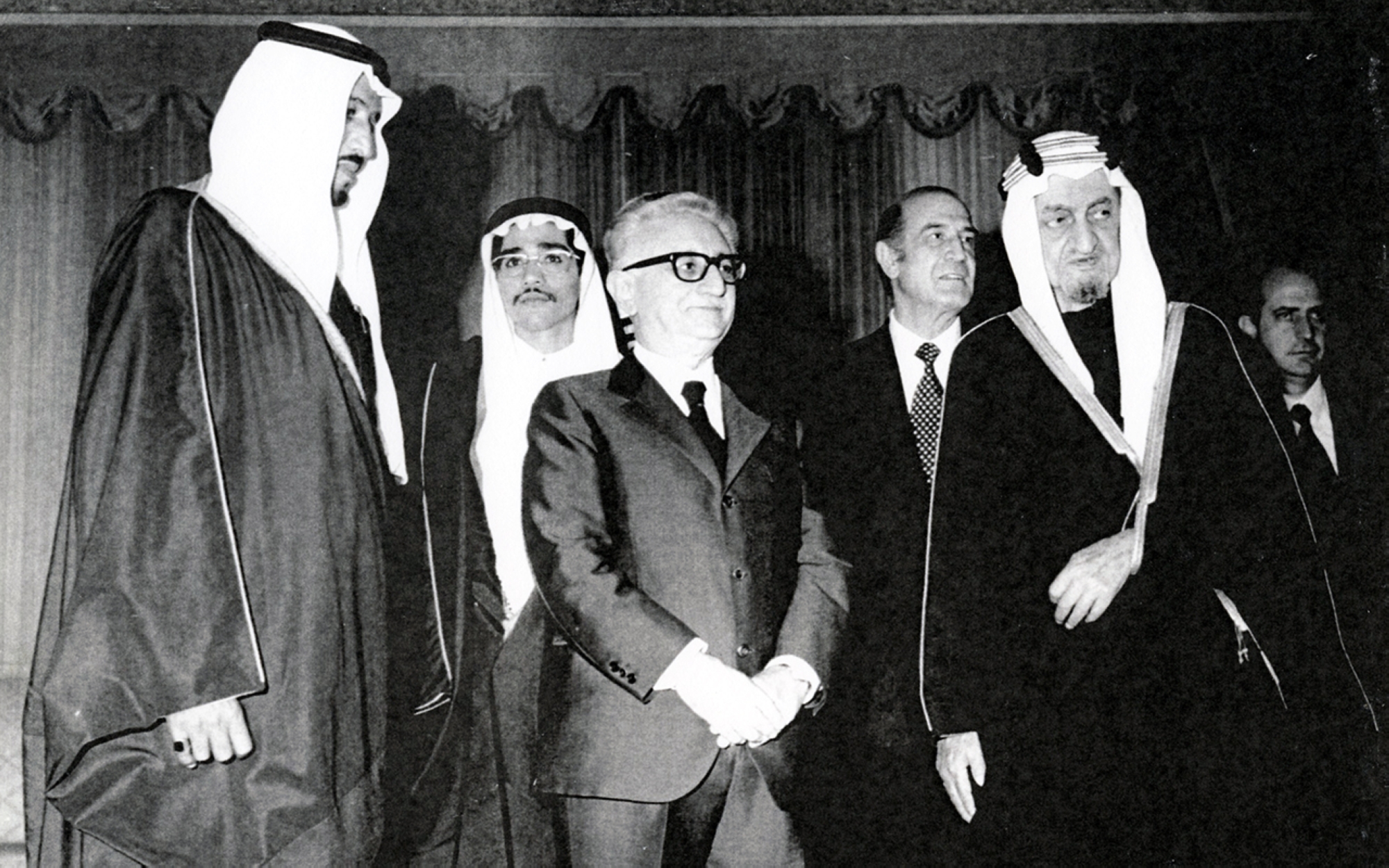
Official positions before his rule
Ministry of Foreign Affairs
King Faisal Bin Abdulaziz was the first to hold the position of Minister of Foreign Affairs, and he was the longest serving, as his term lasted about forty-five years (1930 - 1975). Since King Abdulaziz issued a Royal Decree transforming the Foreign Affairs Directorate into the Ministry of Foreign Affairs, he appointed King Faisal as minister, who was twenty-five years old at that time. He remained the Minister of Foreign Affairs until his death. Since his appointment as the minister of foreign affairs, and during his father's reign, he carried out several foreign missions and trips to strengthen diplomatic relations between Saudi Arabia and other countries, starting with Europe, the United States, and Arab and Islamic countries over approximately twenty-three years. Saudi Arabia gained a high status in international circles and Arab and global forums. It was a founding member of the United Nations in 1945, and an active member in it and in the League of Arab States in 1945. He defended the causes and interests of Arab and Islamic countries, earning him respect and appreciation in international forums. He was chosen by Arab delegations to be their official spokesperson. In 1947, Arab delegations at the United Nations conference agreed to choose King Faisal as their official spokesperson. This allowed him to get acquainted with figures working in regional and global diplomatic affairs. He also received high honors from kings and presidents of different countries.
General Deputy for His Majesty the King
On January 13, 1926, he was appointed as deputy king in Hejaz, acting as the head of its official departments under the title of "General Deputy for His Majesty the King". He became the first deputy king in Hejaz within the modern Saudi State. King Faisal was responsible for pilgrimage, providing supplies and healthcare for pilgrims, and receiving official Hajj delegations and government representatives. On August 29, 1926, he assumed the presidency of the Shura Council, in addition to his role as the deputy king.
Presidency of the Council of Agents
King Faisal assumed the position of President of the Council of Agents on January 14, 1932, after the Council of Agents Law was issued. King Faisal was appointed president of the council, overseeing the following departments: the Royal Court, foreign affairs, finance, military, shura council, interior, presidency of the judiciary, and the princes of the attached regions.
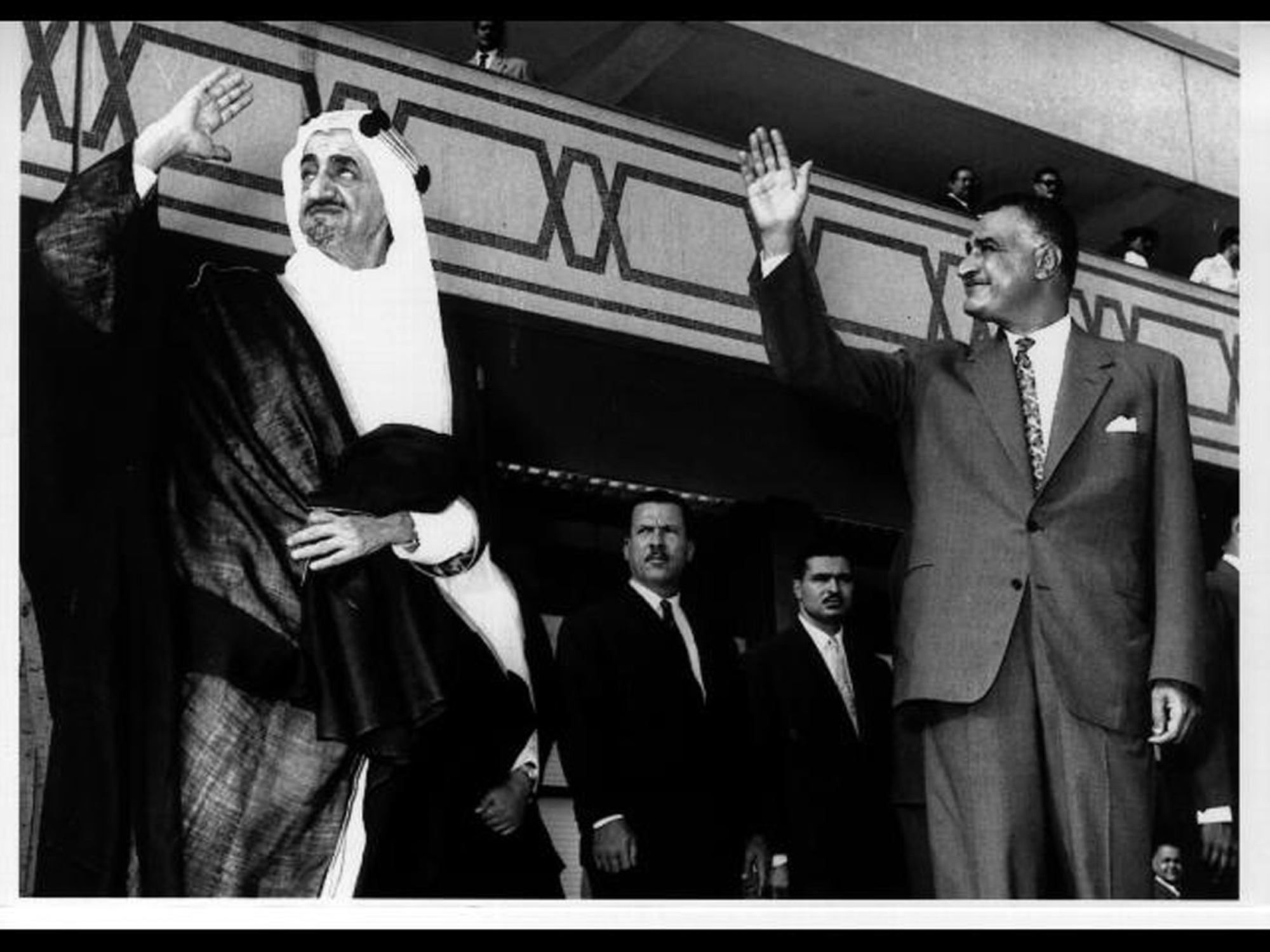
Crown Prince and Presidency of the Council of Ministers
After the passing of King Abdulaziz on November 8, 1953, his son, Prince Saud Bin Abdulaziz, ascended as the King of Saudi Arabia. Prince Faisal was appointed as the crown prince and assumed the presidency of the Council of Ministers. In his role as Prime Minister and Chairman of the Shura Council, Prince Faisal initiated widespread employment opportunities across the state. Prince Faisal retained his position as the Minister of Foreign Affairs.
During this period, King Faisal charted Saudi Arabia's foreign policy focused on Arab unity and solidarity, adopting a stance against colonial presence in the region. He supported Arab liberation movements against colonialism. He chaired Saudi Arabia's delegation in the emergency meeting of Arab heads of government in Cairo, convened by Gamal Abdel Nasser at the Arab League headquarters on January 22, 1955, to discuss the Baghdad Pact and its opposition. He also led Saudi Arabia's delegation to the Bandung Conference or the Afro-Asian Conference in Indonesia on April 18, 1955, to address the Palestinian cause, a conference that committed participants to non-alignment.
King Faisal signed on behalf of King Saud on October 27, 1955, the Joint Defense Agreement with Egypt, which Yemen later joined on April 21, 1956. Among its results was the establishment of the Joint Arab Command which lasted until the unity between Egypt and Syria. On April 20, he attended the Jeddah meeting held between King Saud, Gamal Abdel Nasser, and Imam Ahmed, and the parties signed the Jeddah Security Pact, which was the joint defense agreement. Following the tripartite (British-French-Israeli) aggression against Egypt, King Faisal, as prime minister and minister of foreign affairs, declared in an official statement on October 29, 1956, full support for Egypt against the aggressors, and declared general mobilization in implementation of the joint defense agreement. Saudi Arabia opened the door for its citizens to volunteer to defend Egypt, and it stopped exporting Saudi oil shipments to Britain and France, in addition to cutting diplomatic relations with them.
Charting Saudi Arabia's internal and external policy
On March 24, 1958, King Saud relinquished all his powers to King Faisal by Royal Decree, and Faisal assumed his new duties. In April 1959, Prince Faisal took over the Ministry of Interior alongside his other responsibilities. He also managed state affairs during the absence of his brother, King Saud, who traveled abroad for medical treatment in November 1961. After King Saud returned from his medical trip, Prince Faisal was appointed deputy prime minister, while remaining the Minister of Foreign Affairs. He inaugurated the Conference of Islamic World Delegations in Makkah al-Mukarramah, held after the Hajj season, inviting an Islamic conference in Makkah to discuss Islamic issues. The conference concluded with the establishment of the Organization of Islamic Cooperation, with its main headquarters in Makkah al-Mukarramah.
On September 15, 1962, he traveled to the United States to attend the regular sessions of the United Nations Assembly. During this visit, he attended the meeting of Arab foreign ministers held there and met with President John F. Kennedy at the White House. President Kennedy was impressed by his personality and political abilities. Upon King Faisal's return to Riyadh, he assumed the presidency of the Council of Ministers. He formed a new government on October 31, 1962, which lasted for the remainder of his life and was later adopted by King Khalid, his successor.
King Faisal worked on domestic reform and building and developing the Saudi armed forces. In the first meeting held by his new government, he announced a historic statement on November 6, 1962, consisting of ten points that collectively formed a comprehensive reform program. In his statement, he announced the imminent issuance of the Basic Law of Governance, the Law of Provinces, the Judiciary Law, the establishment of a Council of Ifta, reforming the Committees for the Promotion of Virtue and Prevention of Vice, and improving the social and economic standards.
In June 1963, King Faisal issued a Royal Decree establishing the Saudi Red Crescent Society to oversee ambulance services and fulfill its humanitarian missions. In September 1963, he led Saudi Arabia's delegation to the United Nations during its regular session. Additionally, a Royal Decree was issued in October 1963 concerning the regulation of local administration in provinces. This Province Law defined the tasks of provincial governors, delineated their authorities, and outlined the selection process for local councils. Furthermore, the Council of Ministers, presided by King Faisal, adopted several regulations, including the adoption of the metric system for weights and measures, and the Law on Printed Materials to regulate the press and end individual privileges of newspapers and magazines, transforming them into press institutions. The council adopted the establishment of a High Committee for Administrative Reform chaired by the Prime Minister, with the membership of the ministers of defense, petroleum, transportation, and media.
King Faisal urged Arab leaders to overcome their differences during the first Arab Summit in Cairo on January 13, 1964, to address the crisis of the Jordan River and its tributaries. This was prompted by Israel's commencement of a project to divert the course of the Jordan River. King Faisal met with the Arab Mediation Committee's Good Offices on February 24, 1964, to settle the dispute between Saudi Arabia and Egypt, complying with the resolutions of the first Arab Summit. The meeting concluded with the announcement of the restoration of diplomatic relations between the two countries.
On March 31, 1964, in his capacity as the deputy king and prime minister, King Faisal was entrusted with the responsibility of managing all internal and foreign affairs of the state, including the Supreme Command of the Armed Forces, in the King's presence and absence.
The second Arab Summit was held in Alexandria in 1964, to address the executive measures required to confront Israel. King Faisal chaired this summit, announcing Saudi Arabia's donation of EGP1 million to establish the Palestinian Liberation Army. Subsequent to the conference, the Alexandria Agreement was declared on September 14, 1964. In this agreement, Saudi Arabia and Egypt affirmed the resolution of existing disputes regarding Yemen, preventing armed conflicts. King Faisal returned to Cairo on October 5, 1964, to participate in the Conference of Non-Aligned Countries. During the conference, he met with President Gamal Abdel Nasser, and they agreed to collaborate in resolving ongoing disputes concerning Yemen and mediating among the concerned parties. They also agreed to hold a reconciliation conference in Arkawit, Sudan. This conference was inaugurated on October 29, 1964, with the presence of two Yemeni delegations, one royalist and another republican delegation. The conference concluded with an agreement on a ceasefire.
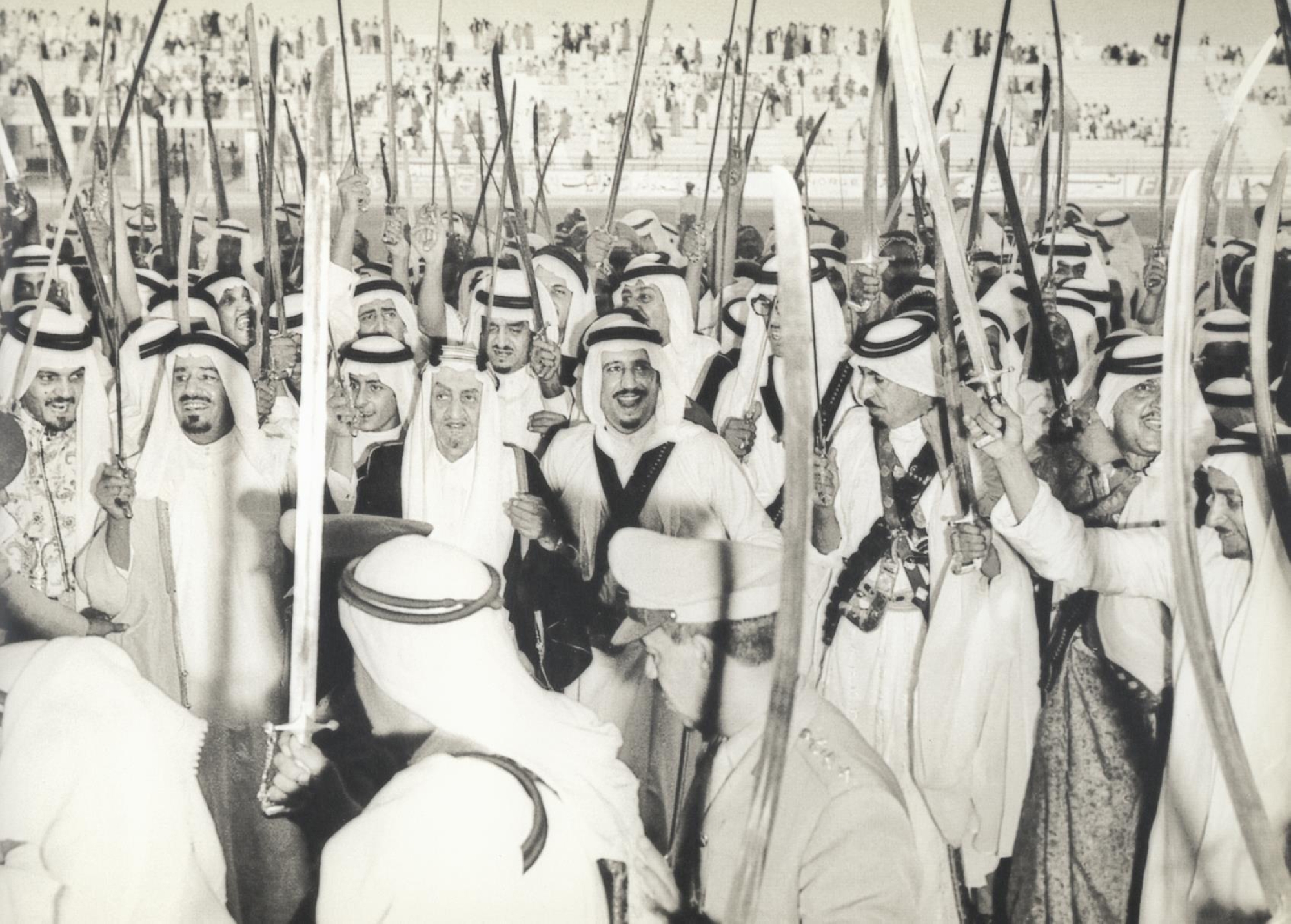
Assuming the Rule of Saudi Arabia
Allegiance to King Faisal
King Faisal was pledged allegiance as king on November 1, 1964, following King Saud's abdication of the rule. In a statement to the nation, King Faisal announced his domestic and foreign policies, expressing his determination to continue reforms across all fields of the state. After his allegiance, he issued a Royal Order amending articles seven and eight of the Council of Ministers Law. As per this amendment, the King became the prime minister, presiding over the council's meetings, with the deputy prime minister representing him. Additionally, the appointment, dismissal, and acceptance of resignations of council members were then conducted by Royal Decree, and all members were held accountable for their actions before the King. King Faisal also attended public festivals held in some cities of Saudi Arabia to celebrate his assume to the rule, he also received official foreign delegations that came to congratulate him.
Initial decisions after assuming the rule
King Faisal began issuing the first resolutions regarding the organization of his government. On March 30, 1965, he appointed his brother, Prince Khalid, as the crown prince. Additionally, he inaugurated the College of Petroleum and Minerals in the city of Dhahran on February 9, 1965, which later became the University of Petroleum and Minerals. The university aimed to provide technological expertise in the fields of petroleum and minerals, and was the first of its kind in the Arab world during that period. Since its establishment, it introduced petrochemical industries that were not previously there. King Faisal also inaugurated the new Taif Road on June 1, 1965, connecting the city of Taif to Makkah al-Mukarramah through rugged mountains, known as al-Hada Mountains.
On July 11, 1965, in the same year, King Faisal issued a Royal Decree approving the political system of the High Judicial Institute. Two days later, he issued another Royal Decree to establish a high ministerial committee consisting of the ministers of interior, finance, labor, and social affairs. This committee was tasked with conducting studies and research on the Bedouin communities, presenting recommendations for their development, and improving the standard of living in those areas. In 1965, King Faisal issued a decree designating the National Day of the country on the day when the unification of Saudi Arabia was declared. This day falls on September 23.
Internal reform of state laws
The years of King Faisal's rule were marked by numerous achievements aimed at improving the life of the Saudi citizen. Since the beginning of his reign, he reconsidered regulating and planning administrative reform, replacing the Supreme Planning Council established in 1960 with a new entity called the Central Planning Organization. This organization later evolved into a ministry. It formulated its first five-year development plan and linked it to the General Development Plan. Since 1970, the state has been aligning its strategy, objectives, programs, and budget with a developmental plan renewed every five years. The first measure in the reform process involved setting up diverse financial reform laws to address the state's economic crisis. King Faisal prioritized education and health, recognizing the necessity for advancement in these domains.
King Faisal's efforts in developing the state sectors
His efforts in education and health
King Faisal developed the education sector, establishing the first supreme organization for education; the "Higher Committee for Education Policy". Its responsibility was to formulate the educational policy for Saudi Arabia. In 1964, the allocations for education reached 13 percent of the state budget. The number of schools for boys increased across all educational levels, and so did the number of girls' schools, which expanded both in their number and the number of enrolled students. The initiation of girls' education took place during the reign of his brother, King Saud. King Faisal supported the resolution to educate girls and its execution. Additionally, he took an interest in technical and industrial education, sending missions abroad. He emphasized literacy eradication among all citizens, irrespective of their segments. In 1972, he issued a decree in that respect. A comprehensive plan was developed to eliminate illiteracy within a maximum period of twenty years. Moreover, he established mobile schools for the nomadic population.
King Faisal was keen on increasing the budget of the Islamic University of al-Madinah al-Munawwarah. In 1971, King Abdulaziz University in Jeddah was transformed into a government university after being private. In 1974, a Council of Ministers resolution was issued approving the establishment of King Faisal University in al-Ahsa. Additionally, King Faisal expanded scholarships for higher education for students abroad and increased external scholarships.
During King Faisal's reign, the budget for the health sector increased. The government focused on preventive healthcare, established health offices and quarantines, and expanded the construction of hospitals, mainly King Faisal Specialist Hospital in Riyadh whose foundation stone was laid on November 11, 1970. Additionally, clinics and mobile units were established in various regions, providing national specialists and health schools. The government provided medical treatment free of charge for citizens and residents.
Developing the state's economy
King Faisal took interest in strengthening the national economy and gradually breaking the monopoly of the Arabian American Oil Company (Aramco) over oil affairs. This led the General Petroleum and Mineral Organization, known as Petromin, to achieve state projects in the fields of mineral and oil resources. Between 1964 and 1968, Petromin acquired a network for marketing petroleum products from Aramco. In 1965, the Saudi Arabian Fertilizer Company (SAFCO) was established and granted the right to explore oil in the central region of Saudi Arabia. This was followed by the establishment of several institutions, totaling sixty-six industrial institutions by 1967.
In 1972, King Faisal succeeded in getting Aramco to agree to the principle of 25 percent participation in the company for the benefit of the Saudi government, and an agreement was signed in this regard on December 20, 1972. Under this agreement, the Saudi side owned 51 percent of the shares by the end of January 1982. In 1974, Saudi Arabia ranked first globally in oil exports and third in production. King Faisal directed the search for other resources, such as mineral exploration, which succeeded in discovering deposits of various types. King Faisal also encouraged agriculture and supported the Agricultural Bank. Several projects were established during his reign, including building dams, and irrigation and drainage projects. The Real Estate Development Fund, the Saudi Industrial Development Fund, and the Investment Fund were also established.
Social development and services
King Faisal's reign was marked by significant advancements on the social level. He adopted the Social Insurance Law that ensured monthly salaries for vulnerable segments of society, such as the elderly, widows, orphans, and those unable to work. Urbanization expanded across the country, providing essential services and necessary facilities for life, including electricity, drinking water, sanitation, telecommunications, and road networks. Notably, the completion of al-Hada Road (Makkah - Taif) in 1965 stood out as one of the massive projects accomplished, alongside the Dammam - Riyadh - Jeddah road. Its final phase was inaugurated on March 1, 1967. This road is considered one of the largest land road projects during that period. It stretches from the city of Dammam on the eastern coast of the Arabian Gulf to the city of Jeddah on the western coast of the Red Sea, passing through the capital, Riyadh, in the central region. It spans approximately 1,537 km, connecting numerous villages and cities situated along its sides.
King Faisal laid the foundation stone for the iron and steel factory on April 8, 1966. This project marked Saudi Arabia's entry into the era of modern industrialization, in addition to issuing a Royal Decree on September 28, 1968, approving a system for distributing reclaimed lands to citizens and private institutions for development. In 1969, he issued a Royal Decree enacting the Social Insurance Laws and ways for its practical implementation.
Development of the armed forces
During King Faisal's reign, the Saudi Armed Forces experienced advancements across its various branches - land, air, and sea. Specialized military cities were established in Khamis Mushait, Tabuk, and al-Kharj, each with its own dedicated schools. Military delegations were dispatched to various countries worldwide, both east and west, and the National Guard was developed. King Faisal was concerned with eradicating illiteracy in the army, through intermediate and high schools that all conscripts are required to attend according to their level of education. This led military service in the country to become an extension of civilian life.
Development of Saudi media
Saudi media began to develop during the reign of King Faisal. Television broadcasting began one year after he was pledged allegiance as king, then television broadcasting switched to color broadcasting. Riyadh Radio was inaugurated in 1964, and its broadcasting was developed to reach all parts of the world in multiple languages including Arabic, English, French, Persian, Swahili, Urdu, and Malay. During his reign, seven press institutions were established based on the Press Institutions Law issued in 1963, raising the number of newspapers to fifteen dailies, weeklies, and monthlies. During his reign, the Saudi Press Agency (SPA) was established, initiating an era of rapid horizontal expansion in media outlets. This expansion was accompanied by qualitative improvements in content and presentation, supported by a foundation of laws and the enhancement of media with high capabilities. On April 10, 1967, he inaugurated the new building of the Ministry of Media in the city of Jeddah.
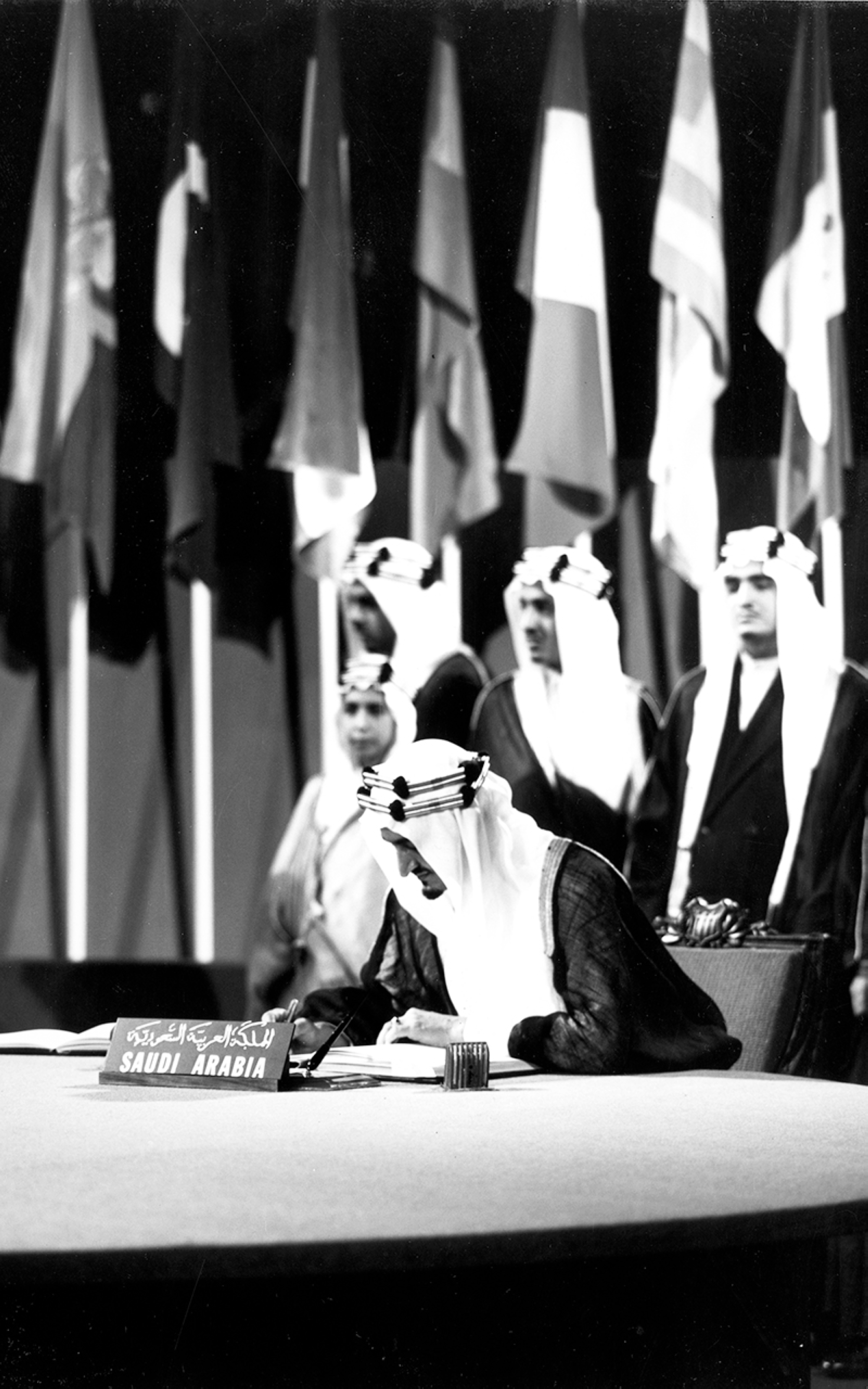
Political Approach of King Faisal Bin Abdulaziz
Arab and Gulf policy
In his Gulf and Arab policy, King Faisal sought to resolve any disputes with neighboring Gulf Arab states. As a result, border demarcation agreements were concluded between Saudi Arabia and both Kuwait and Qatar in March 1966. When Britain announced in January 1968 its intention to withdraw from the Arabian Gulf in 1971, Iran tried to expand its influence. However, King Faisal had supportive positions towards the Gulf countries, as evidenced by his assurance to Sheikh Isa, the Emir of Bahrain, during Riyadh’s reception on January 15, 1968, that Saudi Arabia stands with Bahrain against any attack and supports it with all available resources.
Iran's desire to strengthen relations with Saudi Arabia required addressing the dispute over the Saudi-Iranian maritime border in the central Arabian Gulf. The two parties agreed in Taif on June 29, 1968, on a geographical division of the region, in addition to equally sharing the oil between them. King Faisal agreed to that in order to ensure Iran's support for the establishment of the United Arab Emirates (UAE). King Faisal dealt with the more complicated issue of Iran's attempts to annex the Emirati islands and its opposition to the project of establishing the UAE due to the islands' dispute. King Faisal sought to support the position of the Arab Gulf princes and sheikhs in establishing a union between them, by agreeing with Kuwait to provide more support to the position of the Gulf emirates. He also continued contacting the rulers of the Gulf emirates through mutual visits and exchange of envoys between him and them, to resolve outstanding issues and complete the union before the British withdrawal. He also announced that the United States would help establish a union between the Arab emirates.
King Faisal aimed to resolve the Yemen crisis that the Kuwait Conference failed to settle. A conference was held in Taif in August 1965, continuing the series of conferences to find an effective solution to the Yemeni crisis. Additionally, King Faisal met with President Gamal Abdel Nasser in Jeddah on August 22, 1965, leading to the signing of the Jeddah Agreement. Its key provisions included leaving the Yemeni people to determine the type of governance they preferred and Egypt's withdrawal of its forces from Yemen. Furthermore, it aimed to collaborate on establishing a transitional conference to achieve peace and determine the form of governance.
King Faisal had a strong presence in settling Arab disputes. As the Arab Summit in Casablanca in 1965 approached, King Faisal hastened efforts to unify the Arab nations. The summit commenced on September 12, 1965. King Faisal's participation was a cornerstone that helped lay the foundation for Arab solidarity. This summit was termed the Summit of Arab Solidarity, due to the significance of the resolutions reached by its members. Its objectives were to unify the Arab nations, mitigate differences, and abstain from any country's interference in the affairs of others.
Amid the Arab-Israeli conflict, Saudi Arabia's role emerged during this period, and it became an active player on the Arab and Islamic scene. King Faisal was able to play the role of the main mediator between the Arab parties on the most important Arab issues. He was one of the most clear-sighted and sound in opinion among Arab leaders, and most correct in making the appropriate decision for the interest of the foremost Arab cause, the issue of Palestine.
During the June 1967 war, King Faisal declared his support for the Arab nations under attack. He became the first ruler to send military forces to Jordan and announced a general mobilization in Saudi Arabia. Saudi Arabia expressed readiness to engage in the conflict alongside the Arab countries under attack. Then, in a decisive move on June 10, 1967, King Faisal announced the suspension of Saudi oil exports to both Britain and the United States due to their support for Israel. King Faisal made efforts to convene Arab and Islamic conferences to support the Arab cause against Israel. This stance became a steadfast principle consistently reaffirmed in his official speeches and diplomatic actions.
One of the most prominent conferences that he attended and in which he served as the main mediator was the Fourth Arab Summit held in Khartoum in August 1967, which was attended by representatives of fourteen states. It was later known as the Three No's conference, where it was decided to provide financial support to the confrontation states, to rearm these countries and enable them to cope with the political and military blow inflicted by Israel on the Arab world. Saudi Arabia contributed the largest share of that support.
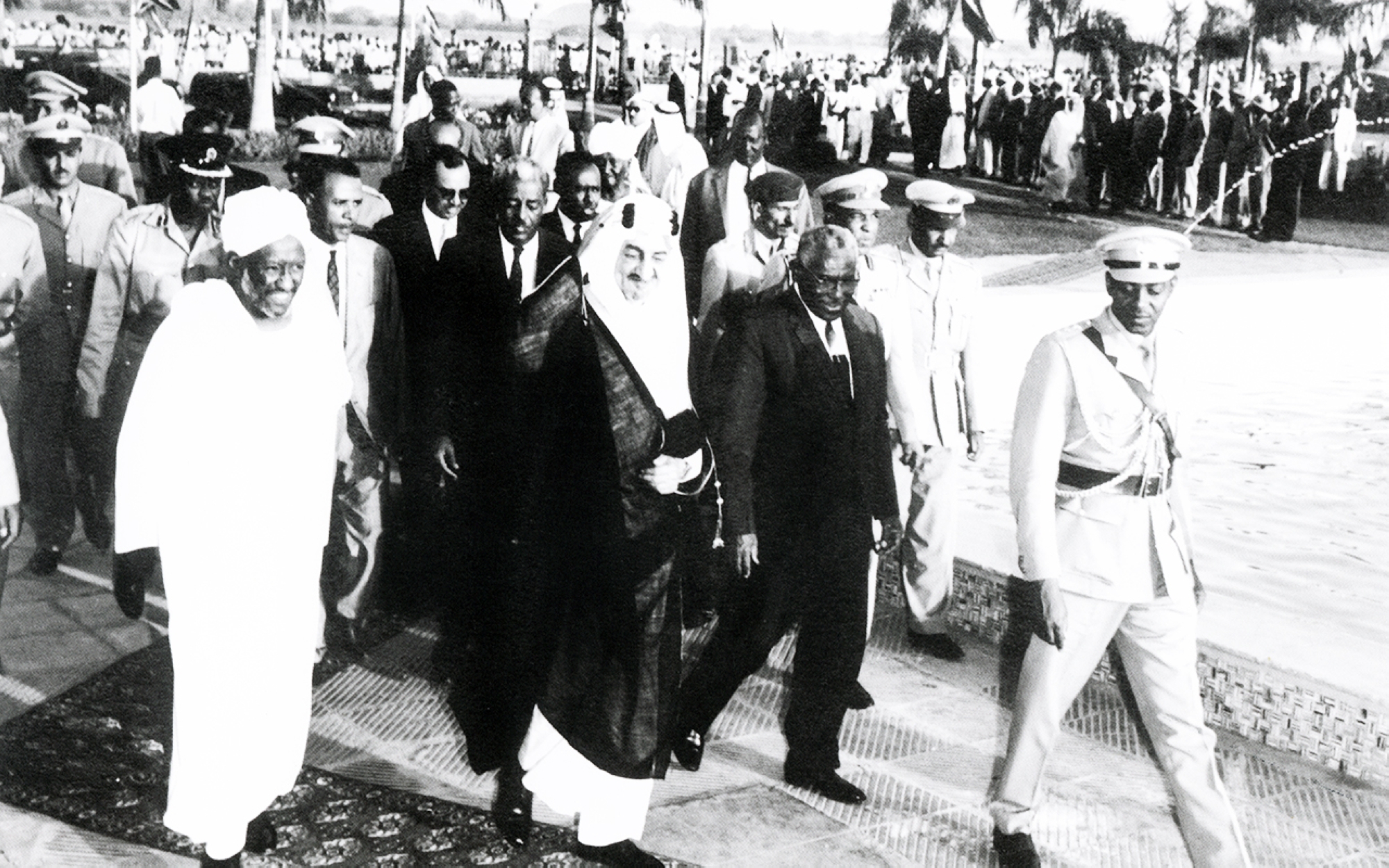
Islamic solidarity
King Faisal expanded Arab solidarity to a wider circle, that of Islamic solidarity, which he sought to achieve three global objectives through: First: Cooperation in the political, social, economic, and cultural fields among the peoples and governments of the entire Islamic world; secondly: Attempting to expel Communist and extreme leftist influence from the Arab region; And thirdly: Attracting Islamic support in favor of the Arab stance against Israel. In pursuit of these objectives, King Faisal visited several Islamic and Arab countries in Asia and Africa, starting with Iran in December 1965, by an official invitation from Shah Mohammad Reza Pahlavi, then Jordan in January 1966, by a similar invitation from King Hussein, followed by Sudan in 1966, invited by Ismail al-Azhari, President of the Sovereignty Council.
In April 1966, King Faisal visited Pakistan in response to an invitation from its President Mohammad Ayub Khan. During the same year, he accepted an invitation to visit Spain from President Francisco Franco. Additionally, in a trip spanning about a month, he visited five countries: Turkey, Morocco, Guinea, Mali, and Tunisia. He was a notable participant in significant Islamic conferences, like the Amman Conference on September 21, 1967, attended by representatives from twenty-one Islamic countries to discuss the aggression against Palestine.
The first Islamic Summit Conference took place in the city of Rabat on September 22, 1969, in response to al-Aqsa Mosque fire in Palestine. It was convened following King Faisal's call to the Islamic world for consultation on ending Israeli aggression. Delegates from twenty-six Islamic countries attended the summit. The outcomes transformed the Palestinian issue from an Arab cause into an Islamic one, with support and solidarity from all Islamic nations standing by its people. This was the objective sought by King Faisal through his call for Islamic solidarity. King Faisal achieved a significant victory for Islamic solidarity, managing to sway the stance of certain countries that had diplomatic ties with Israel in favor of the Islamic cause. The conference set a date for a second meeting in Jeddah, during which the establishment of a general secretariat for Islamic countries was decided upon, intending to become a global organization.
In the second meeting held in Jeddah for members of Islamic countries in 1971, the members agreed to organize relations among Islamic countries through a written charter. The following year, in 1972, the third conference was held, and the number of organization members reached thirty Islamic countries, all of which agreed to adopt the charter. The organization was named the Organization of Islamic Conference (OIC). Two years later, the United Nations recognized the organization and its charter after it proved its efficacy both on the Islamic and the international levels.
King Faisal shifted Saudi Arabia's foreign policy focus towards East Asian countries to gain more support for Arab and Islamic causes. In 1971, he visited Iran, then the Republic of China, at the invitation of President Chiang Kai-shek, marking the first visit by an Arab leader to China. Subsequently, he visited Japan upon invitation from Emperor Hirohito, followed by visits to the United States of America and France.
On October 6, 1973, the fourth Arab-Israeli war broke out. King Faisal played a notable role alongside Egypt and Syria in preparing for and planning the battle. He led efforts to pressure the countries supporting Israel with oil exports, reducing production by 5 percent monthly until Israel withdrew from the occupied territories of 1967. This decision was not applied by neutral and friendly countries that stood by the Arabs at the time, including France, Britain, Spain, and India. Despite continued U.S. support for Israel, King Faisal announced a 10 percent reduction in his country's oil production for the U.S. Other Arab nations followed his lead. When the demands of the Arab countries were not met, King Faisal issued a statement on October 19, 1973, imposing a complete ban on oil exports to the U.S., along with the Netherlands, Portugal, Rhodesia, and South Africa.
The oil battle led by King Faisal coincided with military movements to confront aggression by Egypt and Syria. Additionally, King Faisal issued orders for the Saudi Armed Forces to prepare and move into Syria to support the frontline states. This military collaboration contributed to the Arab victory in the war. The war succeeded in creating a cohesive Arab front. As a result, the U.S. hurried to use all diplomatic means to seek a settlement for the Arab-Israeli conflict. European countries supported the Arab cause, along with non-aligned socialist countries. Moreover, African solidarity and Islamic solidarity emerged, all in support of the Arab cause.
Through his efforts, King Faisal was keen on highlighting Arab-Islamic solidarity to the world. This reached its pinnacle at the second Islamic Summit held in Lahore, Pakistan, in 1974, witnessing a significant Islamic gathering with the attendance of all Islamic countries, except for Guinea, which apologized for its absence. King Faisal supported the Islamic solidarity movement, resulting in the recognition of the Palestine Liberation Organization (PLO) and the establishment of the Islamic Solidarity Fund to finance activities of the Organization of Islamic Cooperation. Among these activities was the support for the resilience of the Palestinian people in Jerusalem and the occupied Palestinian territories. In the same year, the First Conference of Islamic Organizations convened at the headquarters of the Muslim World League in Makkah al-Mukarramah.
Also, the Seventh Arab Summit in Rabat in 1974 was held to discuss the Arab political landscape post-October War. During this summit, the establishment of a financial fund to support the Palestinian issue was agreed upon. The resolutions issued by the United Nations on November 22, 1974, were seen as a success for Arab diplomacy, with King Faisal's efforts prominently featured. These resolutions affirmed support for the Palestinian people's right to self-determination, sovereignty, and independence. Moreover, they granted observer status to the Palestine Liberation Organization (PLO) in the General Assembly and international conferences held under the United Nations.
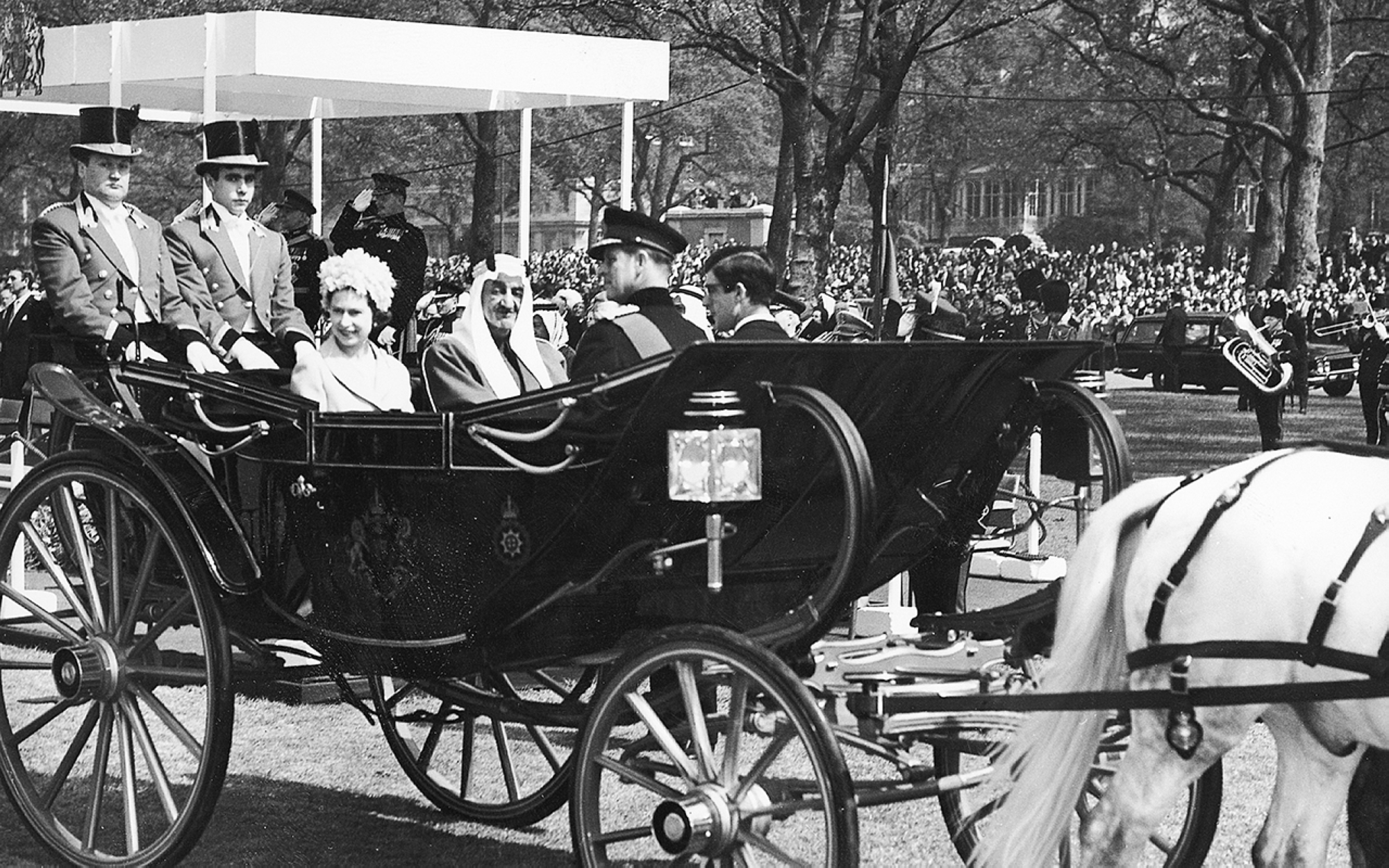
Saudi Arabia's foreign policy during the reign of King Faisal
The foreign policy of Saudi Arabia aimed to maintain the country's good relations with foreign, especially Western, friendly nations - unless their policy conflicted with those of Saudi Arabia. Particularly concerning the Palestinian issue and relations with Israel, he did not hesitate to sever diplomatic ties with countries that showed support for Israel in any form. For instance, this occurred with West Germany on May 14, 1965, when it agreed to pay substantial amounts to Israel. Despite maintaining friendly relations with Britain, King Faisal suspended oil exports to the country during the Israeli aggression against Arab states in 1967. He continued diplomatic dialogue with Britain until he succeeded in persuading them to stand by the Arab cause, notably evident when the Palestinian issue was brought before the United Nations in 1974.
The relationship between Saudi Arabia and the French government experienced a certain level of tension during the reign of King Faisal, due to the King's support for Arab countries colonized by France, such as Algeria, to which he provided financial, military, and moral support. The meeting between King Faisal and President Charles de Gaulle on the eve of the Israeli aggression against Arab countries in 1967 was a significant factor in changing France's stance in favor of Arab rights. As a result, Saudi Arabia's relations with the rest of the European countries, and even with East Asian countries, relations based on the principles of friendship and respect. These relationships were generally free from any blemish, except for some countries' standpoints from Arab and Islamic issues that King Faisal was reserved about and actively worked to strengthen.
The Saudi-American relations were the cornerstone that primarily shaped the personality of King Faisal. The U.S. administration regarded him with respect and appreciation, given his personal presence and the powerful statements demonstrated by King Faisal during his visits to the U.S. and his interactions with American presidents. This credibility propelled him to the forefront.
The martyrdom of King Faisal Bin Abdulaziz
King Faisal was assassinated on Tuesday, March 25, 1975. His successor, King Khalid Bin Abdulaziz, was pledged allegiance as the new king, and Prince Fahd Bin Abdulaziz was appointed as crown prince.
Children of King Faisal
King Faisal had a number of sons and daughters. They are: Abdullah, Mohammed, Khalid, Saud, Abdulrahman, Saad, Bandar, Turki, al-Anoud, al-Jawhara, Hessa, Noura, Sarah, Mashail, Lolowah, Haifa, Munira, Falwa, and Latifa.
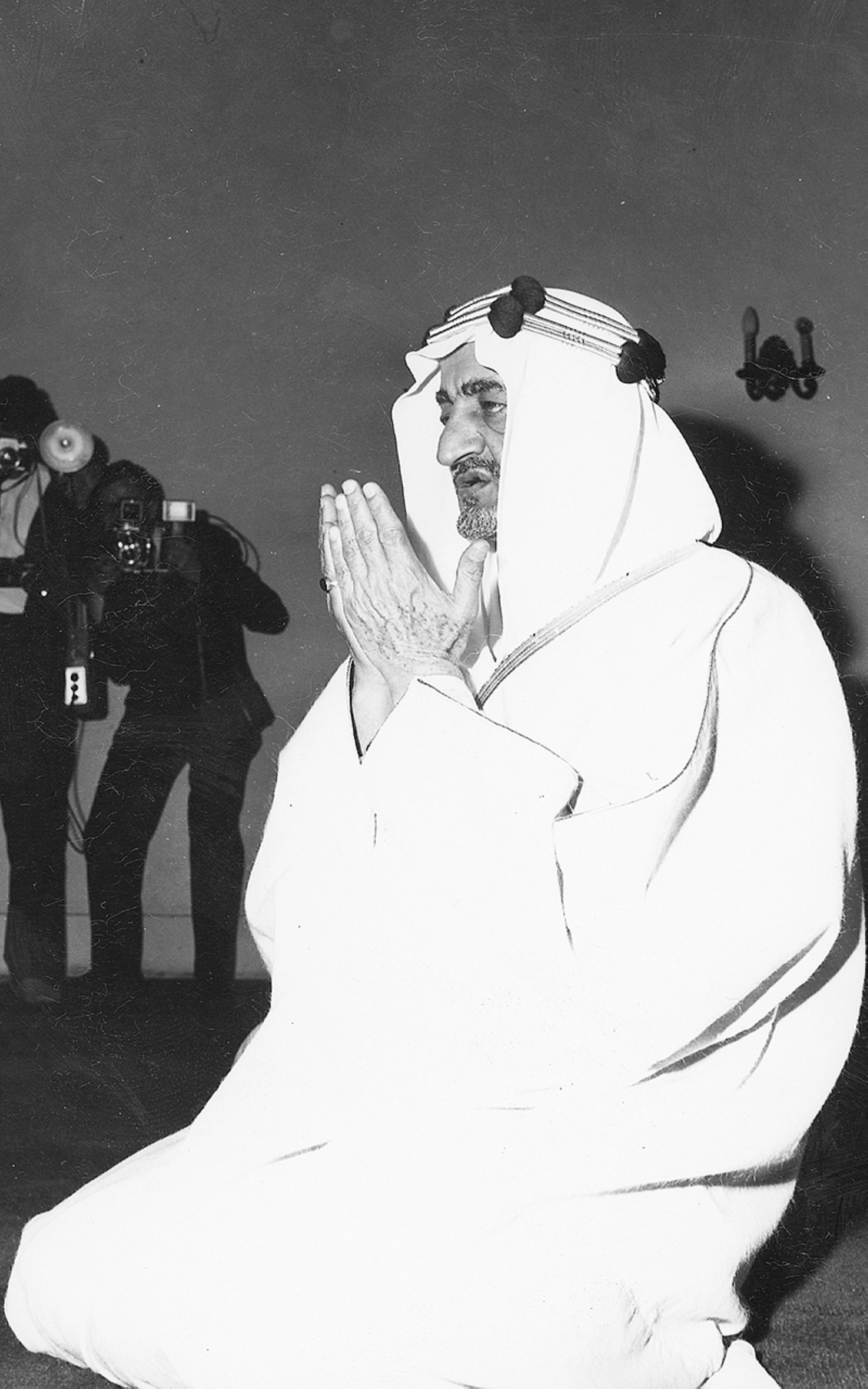
Entities bearing the name of King Faisal Bin Abdulaziz
International King Faisal Prize
The King Faisal Charitable Foundation launched the King Faisal Prize, awarded for the first time in 1979. The prize aims to reward individuals and institutions for their distinct achievements in five different categories: Service to Islam, Islamic Studies, Arabic Language and Literature, Medicine, and Sciences. The prize aims to serve Muslims in their present and future, encouraging them to participate in all fields of civilization. It also aims to enrich human intellect and contribute to the advancement of humanity. Winners are selected based on their eligibility and merit, with specialized committees rigorously reviewing their work. They are chosen according to precise international standards, and the prize is presided over by His Royal Highness Prince Khalid al-Faisal, the third son of King Faisal. The King Faisal Prize's legacy has extended for over four decades, with 290 individuals from forty-five countries around the world awarded the prize.
King Faisal Charitable Foundation
Established in 1976, it is a charitable foundation with global dimensions, with the aim of preserving the legacy of King Faisal and proceeding to fulfill his vision. The foundation has adopted the vision of King Faisal as its guiding principle and maintains financial independence, allowing it to create and develop programs that serve its objectives. From its establishment until 2020, the foundation has spent over SAR2.4 billion to support its supporting pillars, charitable projects, and scholarships. It completed its first charitable project in 1979.
King Faisal Center for Research and Islamic Studies
The King Faisal Charitable Foundation established the King Faisal Center for Research and Islamic Studies in 1983, with the objective of perpetuating the late King's mission of disseminating knowledge between Saudi Arabia and the rest of the world from that time onward. The center has become a beacon of research, knowledge, and culture. The main role of the center lies in providing a knowledge platform that brings together researchers and research institutions locally, regionally, and globally. This platform aims to generate authentic research in the humanities and social sciences, and to engage in scholarly discussions and dialogue among diverse cultures. Its mission is not limited to research alone; the center performs diverse roles ranging from publishing and library to archiving and museum.
The King Faisal Center for Research and Islamic Studies encompasses a number of supporting arms in its services, including al-Faisal Cultural House (Dar al-Faisal al-Thaqafiya), which is the publishing arm of the center, specializing in issuing books and journals on topics relevant to Saudi Arabia and Arab, Islamic, and global societies. There is also the King Faisal Center Library, which provides various services to assist researchers. The Faisal Family Archives (Darat Al Faisal) preserves the heritage of King Faisal and his family, raising awareness about it. Al-Faisal Museum contributes to the preservation and display of valuable collections of Islamic Arab arts, rare manuscripts, and the memories of the late King Faisal.
Related quizzes
Related articles


